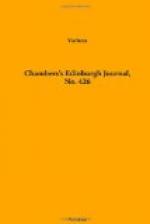Naturalists may learn something from Monsieur Falcony, who states that a solution of sulphate of zinc is an effectual preservative of animals or animal substances, intended for anatomical examination—it may be used to inject veins, and the effects last a considerable time. Another consideration is, that it is harmless: dissecting-instruments left in the solution for twenty-four hours were not at all injured.
A WORD TO GENTEEL EMIGRANTS.
The tide of emigration is rushing so powerfully through the land, that not only labourers and artisans are swept away in its stream, but many of the gentry of the country are beginning to join in the movement, and wonder what they are to do with their young ‘olive branches,’ ’unless they emigrate to Australia, and found a new home and plant a new family there.’ Many of the class have taken this step, and many more are lingering on the brink; and endless and anxious are the inquiries constantly made for the reports transmitted by those adventurous spirits who have led the way to new worlds of enterprise. For the working-classes, all has hitherto been favourable; but for the class above them—the professional man, and the small capitalist—the accounts are not, on the whole, encouraging. ’The labour-market is never overstocked; but,’ says a correspondent of a later date, ’I pity the professional men, the doctors and lawyers, who come out, and the clerks, few of whom are wanted, and who find provisions and house-rent much dearer than at home, and to whom the privations they undergo must be great hardships. Men used to the everyday luxuries of a London life, delicate women bred up in habits of expense and idleness, have a severe ordeal to go through on their arrival in that land of work.’ The change of climate, and the discomfort of their hastily-raised log-cabin, often entered upon when not half dried, frequently produce fevers, which, at home, would require a long succession of nursing, medical attendance, and afterwards change of air; but with only a help, absent whenever it pleases her, often with no medical advice within reach, a damp and cold house half furnished, an uncertain supply of even common necessaries, and a total absence of all luxuries, it is really surprising that recovery takes place at all. Now, it unfortunately happens, that the previous education of all these emigrants has been directly adverse to that which would have been desirable for such an after-life. Young ladies and gentlemen are taught dependence as a duty of civilised life. Children are naturally independent and active, and would gladly use their activity in helping themselves. How proud is a child to be allowed to do any of the servant’s work! and how awful the rebuke that follows the attempt; till at last, poor human nature is cramped, shackled, and gagged.
Hard, then, seems the destiny that removes these pampered children of European society from their luxurious necessaries—the valet, the lady’s-maid, and all the other appendages—and leaves them wholly to their own resources, with their self-inflicted ignorance, and their blundering attempts to remedy it.




